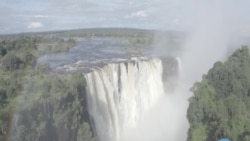After a long and unsettling dry spell, the water at Zimbabwe's Victoria Falls is flowing again, fed by rains upstream in Angola and Namibia. But experts say global warming is having a huge impact across Africa, and the continent needs to take immediate action to help reverse the trend.
Nkosilathi Nyathi, a 17-year-old environmental activist from the resort town of Victoria Falls, says he will not rest until world leaders unite to reduce air pollution and greenhouse gases that are causing global warming.
"It's now time to act," he said. "Use renewable energy and mitigate against climate change. Fifty years from now, what will be my environment if I do not mitigate today? It's now time to act. To the world leaders I say: It's now time to act. Include the youths in your policymaking because those are the people on the ground, the people who are feeling effects of climate change."
At his primary school, Nyathi was part of the "Ozone Defenders Club," which created a biogas station in 2016 that is now used to prepare food for the students.
Nyathi hopes that with more funding, his old school and others nationwide can move away from using firewood as part of efforts to curb deforestation in Zimbabwe.
On the sidelines of a regional Sustainable Development Forum, James Murombedzi, the officer-in-charge of the U.N. African Climate Policy Center, says the continent must invest in researching climate change and building resilience, as Africa is bearing the brunt of global warming.
"Here in southern Africa, we know that this is going to be the most affected region. It is going to get drier and it going to get hotter," he said. "Already we have witnessed the impact on the Zambezi River system. It has been drying. Some projections are that Zambezi might lose up to 20 percent of its water by 2050, which is not very far from now. If that Kariba Dam, for instance, is going to lose up to 60 percent of [power] generation capacity. Victoria Falls might [dry] up, which means you going to lose a lot of tourism revenue."
Already, Africa is facing a crisis. The United Nations says recurring droughts have left 22.8 million people in Africa severely food insecure.







